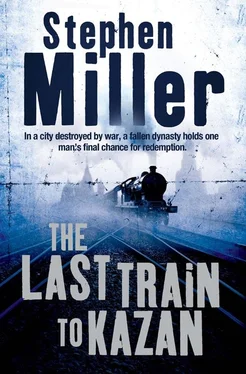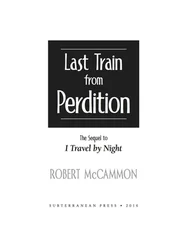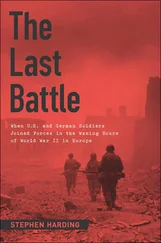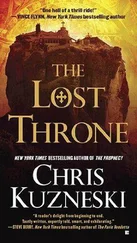The Last Train to Kazan
Stephen Miller
For St Elmo’s daughter
Cover Page
Title Page The Last Train to Kazan Stephen Miller
Moscow July 1918 Moscow July 1918 The first bloody summer of the revolution – and the Bolsheviks are losing. White forces are pushing towards Moscow from all points of the compass. Forced to make a separate peace with Germany, the Red leaders are loathed by the Allies and many of their own supporters. Terrible atrocities occur each day in the name of freedom, in the name of the workers, in the name of God. The Revolution hungers for money, for bullets, and for credibility among the proletariat. As Bolshevik support wanes, one of the only cards left is the Imperial Family – Tsar Nicholas, the Empress Alexandra and their children, initially under house arrest at Tsarskoye Selo, then moved to the remote Siberian town of Tobolsk, and soon to be moved once again. These re-locations are justified to the Romanovs as being necessary for their own protection. It is plausible; after all, there are millions who blame the Tsar for all their misfortunes – for their failed war, for their poverty and their ignorance, for the dream of a workers’ paradise that appears to be stillborn. Now in this darkest hour of the People’s Revolution, the Romanovs have become a commodity, their value rising and falling on an informal exchange between realpolitik and monarchist nostalgia. Among the several contending forces, some want to rescue the Romanovs, others want to kill them, but all want to use them in some way. They are seen by everyone as a lever. And no one knows their fate.
1
2
3
4
5
6
7
8
9
10
11
12
13
14
15
16
17
18
19
20
21
22
23
24
25
26
27
28
29
30
31
32
33
34
35
36
37
38
39
40
41
42
43
44
45
46
Sources and acknowledgements
About the Author
Praise
Also by Stephen Miller
Copyright
About the Publisher
The first bloody summer of the revolution – and the Bolsheviks are losing. White forces are pushing towards Moscow from all points of the compass.
Forced to make a separate peace with Germany, the Red leaders are loathed by the Allies and many of their own supporters. Terrible atrocities occur each day in the name of freedom, in the name of the workers, in the name of God. The Revolution hungers for money, for bullets, and for credibility among the proletariat. As Bolshevik support wanes, one of the only cards left is the Imperial Family – Tsar Nicholas, the Empress Alexandra and their children, initially under house arrest at Tsarskoye Selo, then moved to the remote Siberian town of Tobolsk, and soon to be moved once again.
These re-locations are justified to the Romanovs as being necessary for their own protection. It is plausible; after all, there are millions who blame the Tsar for all their misfortunes – for their failed war, for their poverty and their ignorance, for the dream of a workers’ paradise that appears to be stillborn.
Now in this darkest hour of the People’s Revolution, the Romanovs have become a commodity, their value rising and falling on an informal exchange between realpolitik and monarchist nostalgia. Among the several contending forces, some want to rescue the Romanovs, others want to kill them, but all want to use them in some way.
They are seen by everyone as a lever.
And no one knows their fate.
Pyotr Mikhalovich Ryzhkov walked across the bright Neglinnaya Prospekt to the Hermitage restaurant. He was dressed in a brown suit, his least shabby, and carried his fedora in his hands since it was too hot to wear it. Moscow was stifling, a spider’s web of streets that radiated from the river and ran uphill, spreading above the Kremlin and the old wall of the city until they intersected the ring of gardened boulevard just next to the restaurant.
He was pretending to be a poetic soul, musing on beauty and lofty thoughts during the tram ride up from Tatarskaya. Yes, a poetic soul – a translator and valued member of the French embassy staff. A Russian veteran of the Foreign Legion, caught up in the Western Front war, and newly posted from Paris to Moscow on account of his background. Well…if anyone checked, that much was true. Translating? Yes, he actually did some translating, but mostly it was to explain to this bosses what a particular scrawled message might mean, or to interpret a phrase taken from a stenographer’s transcript of an intercepted telephone call.
What he really did for his salary, and purely because he had very little choice in the matter, was organize a short string of informants, both in and out of the Bolshevik government, who sporadically provided information to France. And, since everything was in chaos, the Bolsheviks suffering from factional disputes, there was no shortage of recruits. Ryzhkov did not have the privilege of selecting most of his sources, and therefore he was expendable. He knew all that. He was more than painfully aware that he was one of the only experienced agents working for the French, but precariously out on the point, with no uniform, no credentials.
But now perhaps he had somehow actually grown into the skin of a poseur. His life had been a lie for so long, and his deceit tested by enough challenges, that pretence and play-acting had been annealed into his being. If he were to be honest, he would have to admit that he fought almost every day to remember who he really was. The only way out of it all was to either win or surrender – not really much of a choice, he was thinking.
And then he saw the man, the same one he had seen in Theatre Square, waiting by the tram stops.
Paranoid, he thought. Occupational disease. After a while you saw the same people all the time. True, Ryzhkov had a great memory for faces; the man could be someone he’d seen before, outside on the street, in a café. Just an ordinary citizen en route to – where, exactly?
Don’t think about it. Go on as usual.
And so he did. Musing about the city. Poetic soul.
He waited until the tram stopped, swung out of the seat and down onto the wide sidewalk and walked past the fence to the entrance to the park.
Test them, he was thinking. It could be an exercise, so test them. Do nothing out of the ordinary, but test them all the same.
He stopped, checked his watch. Ah…early. Stroll around, have a smoke. Admire the church in the far corner by the little pool that they’d built into the park. Yes, yes, a beautiful day. Pose as a happy man; tip your hat to the ladies, smile at the children. A nobody, a clerk-translator on his day off, going to meet his friend at the popular restaurant. Half way around the pool he checked his watch again, made a new decision and turned around.
Ahead of him two men casually stopped and fussed for cigarettes in their clothing.
He walked faster now, heading back to the restaurant, up the steps. Under the new administration the Hermitage was a ‘people’s canteen’ and, reservations being an affectation of the upper classes, service was strictly by queue. But one still had to pay, and there were only two couples waiting ahead of him.
He was directed to his table. Made a show of waiting for his friend. Ordered a glass of konyak and then went to the bathroom. In the farthest toilet he reached behind the tank and found the little magnetized box, pulled it away, opened the cap, took out the rolled cigarette papers, capped the box, hid it behind the tank in the horizontal position, flushed the toilet and, still holding the paper in his fingers, went out to the sinks. No one. A flush in the corner stall; at nearly the same moment the door to the washroom swung open and an older man entered fumbling with his pants buttons. They wouldn’t try to take him in the restaurant itself, he was thinking.
Читать дальше












